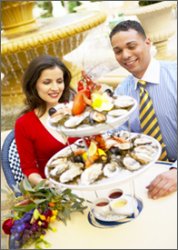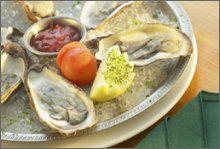It has been considered common knowledge for eons upon eons: oysters make great aphrodisiacs.
But do these sea creatures truly hold the power to, well, titillate in that way? Where did the notion come from? And should you be eating oysters at all?
What Exactly are Aphrodisiacs?
An aphrodisiac is an agent that is said to arouse or increase one's sexual desire. They can be a food, drink, drug, or scent that (their promoters claim) elicits desire and arousal, enhances one's drive and "performance," and extends sexual energy.
For thousands of years, certain foods and drinks have been labeled as aphrodisiacs.
In fact, aphrodisiacs were first sought out as a remedy for several sexual anxieties, including fears of inadequate performance or the need to increase fertility. Procreation was an important moral and religious issue and aphrodisiacs were sought to ensure both the male and female potency.
|

It was rumored that Casanova ate over 50 raw oysters a day to boost his libido. Their most classic preparation is raw, also known as "on the half shell," when they are supposedly their most potent.
|
Why Oysters?
Oysters have been linked with love and sexuality for thousands of years.
The word "aphrodisiac" was born when Aphrodite, the Greed goddess of love, sprang forth from the sea on an oyster shell and promptly gave birth to Eros. Because Aphrodite was said to be born from the sea, many types of seafood have reputations as aphrodisiacs.
Many ancient people believed in the so-called "law of similarity," reasoning that an object resembling genitalia may possess sexual powers. Ginseng, rhinoceros horn, and oysters are three classical examples.
Back in second century A.D., a satire by Juvenal, a Roman satirist, mentioned that the Romans documented oysters as an aphrodisiac food. In fact, Juvenal wrote about the reckless ways of women after they had ingested wine and ate "giant oysters."
It is further noted that some believe oysters gained their reputation at a time when their contribution of zinc to the nutritionally deficient diets of the day could improve overall health and therefore lead to an increased sex drive.
Are Oysters Really an Aphrodisiac?
According to the Food and Drug Administration, the reputed sexual effects of so-called aphrodisiacs are based in folklore, not fact.
This topic has been reviewed and disputed by many scientists. However, to date there is no known scientific proof stating that any supposed "aphrodisiac" actually results in an increase of sexual desire.
|

Oysters are one of the most nutritionally well balanced of foods, containing protein, carbohydrates and lipids. The National Heart and Lung Institute suggest oysters as an ideal food for inclusion in low-cholesterol diets. They are an excellent source of vitamins A, B1(thiamin), B2 (riboflavin), B3 (niacin), C ( ascorbic acid) and D (calciferol).
|
Nope, not even oysters.
According to John Renner, founder of the Consumer Health Information Research Institute (CHIRI) "The mind is the most potent aphrodisiac there is. It's very difficult to evaluate something someone is taking because if you tell them it's an aphrodisiac, the hope of a certain response might actually lead to an additional sexual reaction."
In the case of oysters, chemical analysis shows that it consists of water, protein and carbohydrates, plus small amounts of fat, sugar and minerals. None of these components are known to affect sex drive or performance.
The psychological impact of believing that oysters are aphrodisiacs is sometimes strong enough to produce, at least temporarily, greater sexual desire or performance. The experience of enhanced arousal or performance is then falsely attributed to the wonder food, and this discovery is passed on to the next person wishing to experience new heights of sexual experience.
Oyster Facts
Oysters may not cause sexual desire or love, but many people have certainly fallen in love with oysters. They are eaten raw, smoked, boiled, baked, fried, roasted, stewed, canned, pickled, steamed, and broiled (grilled).
Because they are found in the ocean, they can be an expensive food in places where they aren't harvested. In fact, they must be flown in daily to areas such as the Midwest because fresh oysters must be alive just before consumption. They must be tightly closed; oysters that are already open are dead and must be discarded.
Though ensuring they are clean and fresh is essential, healthy oysters can be a healthy choice for those who choose to eat them. Oysters are extremely low in calories -- one dozen raw oysters contain approximately 110 calories -- and are full of vitamins and minerals like A, B1, B2 ,C and D, calcium, iodine, iron, potassium, copper, sodium, zinc, phosphorous, manganese and sulphur and the all-important omega-3 fatty acids.